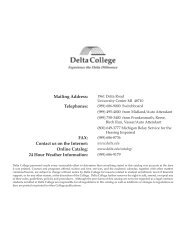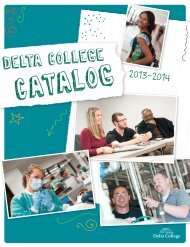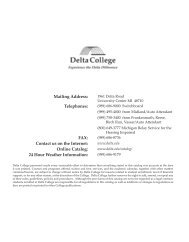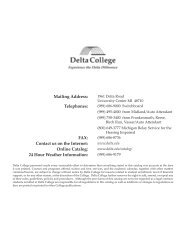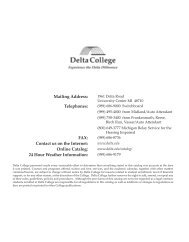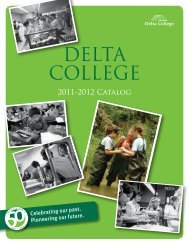2012 - 2013 catalog - Delta College
2012 - 2013 catalog - Delta College
2012 - 2013 catalog - Delta College
Create successful ePaper yourself
Turn your PDF publications into a flip-book with our unique Google optimized e-Paper software.
We’re going the distance... so you don’t have to.<br />
Students today require learning flexibility…and <strong>Delta</strong> <strong>College</strong> is committed<br />
to providing you with learning options that fit into your busy<br />
life style. The Internet,Virtual Classrooms, and other technologies are<br />
making college degrees attainable through eLearning.<br />
The advantages of eLearning courses are convenience and flexibility –<br />
not simplicity. Students must be highly motivated and disciplined to<br />
be successful in an eLearning course. Successful students communicate<br />
with their instructors regularly. Students are highly encouraged to access<br />
their virtual course sites and contact their instructors on the start<br />
date of the semester.<br />
If you would like to learn more, contact the eLearning Office at 989-686-<br />
9088 or by e-mail at elearning@delta.edu<br />
<strong>Delta</strong> <strong>College</strong> eLearning Course Options:<br />
• Internet Courses (INET) - An Internet course is a course designed<br />
to deliver 100% of the course material/content, assessments and<br />
required online interactive discussions between professor-tostudent(s),<br />
student-to-professor or student-to-student(s) exclusively<br />
through the Internet by a qualified Internet professor. Any assessments<br />
requiring proctoring can be conducted at the <strong>Delta</strong> <strong>College</strong><br />
Academic Testing Center or any approved off campus sites. Instructors<br />
may offer optional face-to-face orientations for students who<br />
choose to attend. Some Internet courses may require an additional<br />
content fee for access to required online course content.<br />
• Blended Courses (CNET) – A Blended course requires both<br />
Internet and traditional face-to-face meeting times. The distribution<br />
of course material assessments and interactions between professorto-student(s),<br />
student-to-professor, or student-to-student(s) are<br />
delivered in a combination of both Internet and face-to-face meeting<br />
times that is to be determined by the professor. The syllabus will<br />
list the dates for required face-to-face meetings or the instructor<br />
will inform the class at the first session according to the date listed<br />
on your student schedule. Testing can be done online or in the<br />
classroom. Information will be provided in the college syllabus or<br />
stated by the instructor.<br />
• Synchronous Online Courses (SNET)– A Synchronous online<br />
course is delivered entirely over the internet using out-of-classroom<br />
technology-based learning, and required online meeting times.<br />
The distribution of course material assessments and interactions<br />
between professor-to-student(s), student-to-professor, or studentto-student(s)<br />
are delivered in a combination of both internet and<br />
online meeting times that is to be determined by the professor. The<br />
syllabus will list the dates for required online meeting dates and<br />
times.<br />
Michigan Community <strong>College</strong> Virtual Learning Collaborative (MC-<br />
CVLC) is a collaboration between Michigan community colleges that<br />
allow <strong>Delta</strong> <strong>College</strong> students to take eLearning courses from other<br />
community colleges in Michigan. If a specific course is not available at<br />
<strong>Delta</strong> <strong>College</strong>, you may find comparable courses through the MCCVLC<br />
at www.mccvlc.org. Check with your counselor to make sure the course<br />
credit will transfer back to <strong>Delta</strong> <strong>College</strong>.<br />
On the Web: www.delta.edu/elearning<br />
International Travel/Study Courses<br />
<strong>Delta</strong> <strong>College</strong> offers international travel/study courses on an annual<br />
basis. These courses are usually offered for four credits which<br />
include a combination of lecture and field experience in group<br />
international travel; however, since the length of travel time may<br />
vary from one to four weeks, the Curriculum Council has approved<br />
variable credit, depending on the length of the travel field experience.<br />
Consequently, travel/study courses may vary in credits from a<br />
minimum of one to a maximum of four. These courses are numbered<br />
268 and may be taken in various disciplines; i.e., BIO 268, ECN 268,<br />
SOC 268. The specific country/region of focus will be listed after the<br />
course number and title (SOC 268 International Studies: Australia).<br />
You may register for only one travel/study course per trip. You<br />
should consult a counselor regarding the transferability of total<br />
credits earned through international study and travel.<br />
Learning Community Courses<br />
Learning community courses are courses in which:<br />
1. Disciplines are taught together (for example, literature with history,<br />
calculus with physics, criminal justice with psychology) so that the<br />
connections between them are clear.<br />
2. You can work with other students on activities and projects.<br />
3. You can interact with other students and teachers and be part of a<br />
closely-knit, supportive community of learners.<br />
4. You may experience a variety of learning modes such as participating<br />
in large and small group discussions, working on activities<br />
and projects, taking field trips, and hearing lectures.<br />
5. Students and teachers work closely together, contributing what<br />
they already know and seeking new knowledge.<br />
6. You get to express your thoughts and ideas and to hear those of<br />
your fellow students.<br />
7. You can gain self-confidence about yourself as a student, a thinker,<br />
a reader, a writer, a speaker, a listener.<br />
These courses usually combine two or more different disciplines or areas<br />
in order to show the connections between them. They are taught by at<br />
least two instructors, each from the different disciplines or areas included<br />
in the course. Each semester, <strong>Delta</strong> <strong>College</strong> publishes a complete list of<br />
learning community courses in the Course Guide booklet.<br />
Independent Study Course Information<br />
Independent Study refers to enrollment in an appropriately-designated,<br />
variable-credit course for a specific plan of study, authorized and supervised<br />
by a consenting faculty member. Independent Study is not a<br />
substitute for regular courses, but an enrichment opportunity. Normally,<br />
it is a project designated to allow you to investigate an area of interest<br />
not within the scope of a regular course, to probe more in depth than<br />
is possible in a regular course, or to obtain an educational experience<br />
outside that normally offered by a regular course.<br />
Guidelines for an Independent Study course are:<br />
1. Proposals: The Independent Study project is normally student-initiated.<br />
Early interaction with faculty is essential in the development<br />
of a mutually-acceptable project description. At a minimum, such<br />
a description should contain an outline of the study topic, specification<br />
of the work to be done and the materials to be read, the credit<br />
to be given, the type and frequency of faculty-student contacts,<br />
and a statement of the evaluative criteria to be used by the faculty<br />
member.<br />
2. Approval Process: The faculty member must accept and approve<br />
the project and then submit the agreed-upon proposal on the appropriate<br />
form to the Department Chair for approval. The granting<br />
of approval by the Department Chair may involve considerations,<br />
such as faculty workload, which go beyond the merits of the project.<br />
If the Chair approves, information copies of the form are then<br />
submitted to the Academic Dean and Registrar’s. The student may<br />
register for the project after the authorization form is received by<br />
Registrar’s.<br />
3. Responsibility: Independent Study is basically a tutorial process,<br />
necessarily involving substantial faculty participation. Students<br />
are on their own when pursuing an Independent Study, because it<br />
involves no class meetings or formal lectures. The faculty member<br />
is the responsible custodian of the project, obliged to provide guidance,<br />
assistance, criticism, suggestion, and evaluation.<br />
4. Variable Credit: With faculty approval, credit may vary from one<br />
to six credits.<br />
<strong>Delta</strong> <strong>College</strong> <strong>2012</strong>-<strong>2013</strong><br />
337



